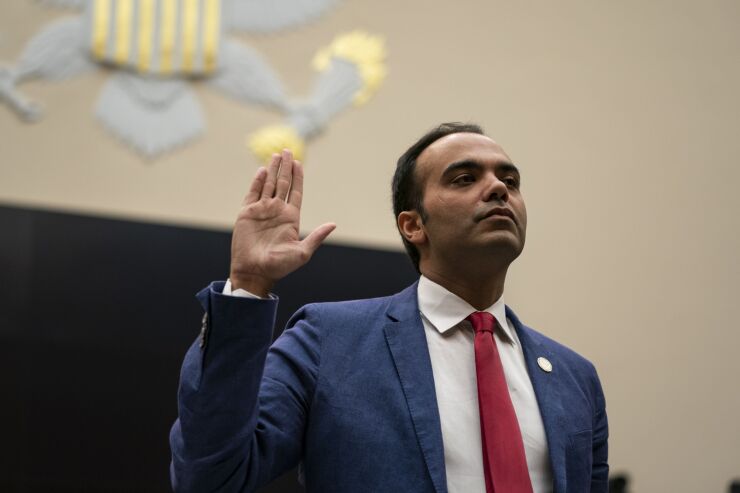Rohit Chopra was confirmed by the Senate to serve as director of the Consumer Financial Protection Bureau, returning a consumer watchdog to an agency that has been rocked by partisan divisions over the scope of its power.
Chopra was approved Thursday by the Senate in a 50-48 vote along party lines. He has been serving as a member of the Federal Trade Commission.
He was announced as the administration's choice to lead the CFPB nine months ago, before President Biden took office. Chopra succeeds Kathy Kraninger, who was appointed in the Trump administration after having served as a senior official at the Office of Management and Budget. She led the CFPB for two years before
The CFPB director serves at the pleasure of the president after a

Chopra, 39, has been a vocal critic of big tech companies as an FTC commissioner, and advocated for increased restitution for consumers. He previously served for five years as the CFPB’s student loan ombudsman under former CFPB Director Richard Cordray.
His confirmation was
Many expect Chopra will
“The CFPB will have a leader who is ready to stand up to the biggest banks and the most powerful corporations to protect families, service members, students, and the elderly,” said Senate Banking Committee Chair Sherrod Brown, D-Ohio.
But Republicans worry Chopra will revive pre-Trump enforcement practices that they say were too aggressive.
Before the vote on Thursday, Sen. Pat Toomey, R-Pa., the ranking member of the Senate Banking Committee, said Chopra would return the CFPB to "the rogue, unaccountable, anti-business agency that it was during the Obama administration."
Richard Hunt, the CEO of the Consumer Bankers Association, urged Chopra to put politics aside and avoid repealing rules enacted during the Trump administration.
“Under Director Chopra’s leadership, the Bureau should strive for financial regulations that last longer than a power shift in Washington,” Hunt said in a press release. ”Constant changes in leadership can cause considerable uncertainty for consumers, small businesses, and financial institutions when rules are repealed and rescinded between directors.”





